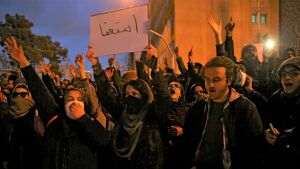• "Benjamin Netanyahu started the fighting hoping it would help him win the elections"
• The ordinary Europeans are paying for the sanctions levied upon Iran
• His Excellency Dr. Bahador Aminian Jazi, the Ambassador of the Islamic Republic of Iran in Bucharest
Reporter: Your Excellency, how does Iran view the ceasefire agreement between Israel and Hamas?
Dr. Bahador Aminian Jazi: First of all, I would like to express my regret for the fact that following the conflict in the Gaza Strip, over 160 Palestinians died, and at least 1,500 were hurt. Unfortunately, the international media did not have an appropriate reaction concerning this situation. There wasn't enough talk about these losses of human lives, which means that the press uses a double standard. The people who died in the Gaza Strip have the same rights as all the other people in the world, and because of that, we need to have an appropriate reaction. UNICEF announced that tens of children died, and several hundreds were wounded.
The lack of a reaction to the death of these people is a tragedy. In Europe in particular, people don't want to remember all the horrors that the Palestinian people went through, and this is a consequence of the behavior of the Western media.
As for the ceasefire agreement, I think that it represents a major victory for the Palestinians, and a major defeat for the Israeli expansionism.
Israel started a war against innocent people and I don't think it was expecting such a strong reaction. In the end, after eight days of continued pressure on the Palestinians, the Israelis were forced to accept the ceasefire.
It is a great achievement of the Palestinians, who need to be congratulated for their achievement.
Reporter: Israeli president, Shimon Peres, accused Iran of supporting the extremist factions in the Gaza Strip and of supplying weapons to all the factions which are fighting to gain the power in those territories. How would you comment on these accusations?
Dr. Bahador Aminian Jazi: Iran, along with other countries, has stated that it supports the Palestinian resistance. When somebody occupies a territory that belongs to someone else, killing innocent people and leading a policy for installing tyranny, somebody has to do something in that regard.
We are against occupation and we support those who oppose it. But this support has different meanings. We support the Palestinians politically and psychologically, using every legal means we have available. Israel is supported by many countries, which give it weapons which it uses to kill innocent people, and nobody says anything about that. The Palestinian resistance movement needs support, not just from Iran or the Islamic world, but from all those who love justice. But this support must come in a legal form.
Reporter: Some analysts believe that Iran will be more cautious in its position toward Israel since the conflict in the Gaza Strip demonstrated its anti-missile defense capabilities. How does Iran view these statements?
Dr. Bahador Aminian Jazi: I think that things are exactly the other way around. The conflict in the Gaza Strip has shown that Iron Dome (ed. note: the Israeli anti-missile system) isn't working like it should. The fact that some of the Palestinian rockets, which aren't very sophisticated, succeeded in getting past this shield, proves its weaknesses. Israel wanted to show that its defense system was unbeatable, but it has been made clear that this is not the case.
The advertising of the Iron Dome was done for psychological purposes. But we need to look at what's happening on the spot. Where was the Iron Dome when the missiles launched by the Palestinians reached Tel Aviv? The system is also very expensive, as each missile launched by the Israelis costs about 50,000 Euros. On the other hand, the Palestinian rockets only cost a few hundred Euros. The Palestinian weapons aren't very sophisticated, considering the fact that they are manufactured in Gaza, in their "prison", because Israel has turned the Gaza Strip into a prison for Palestinians. This is where they have finished a rather modest - performance-wise - technology, which they nevertheless managed to hit Tel Aviv with. This doesn't seem to be viewed as a success by Israel. Even though Israel is trying to promote the idea that Iron Dome has seen a success, in my opinion, the system is actually a total failure.
You are asking me if Iran should be more careful. My answer is: no, it's Israel that should be more careful. We have a much better technology than the Palestinians; our missiles are completely different from theirs. The Fajr-5 type missiles, made by the Palestinians, do not represent weapons of the latest generation, we have used that technology a few years ago.
When Israel couldn't deal with the Palestinian armies, how does it think that it can handle the Iranian ones? I don't think that Israel will be using the same tone with Iran, after this conflict. If just one of the Iranian rockets, which everybody knows how powerful they are, were to hit Tel Aviv, it would create panic in Israel.
We don't want to start any war, or use military force under any situation. But we will protect ourselves, if we are attacked, just like the Palestinians do.
Do not pay attention to the propaganda; focus on what is happening in the region. Israel is very good when it comes to propaganda, to manipulating people, to changing data, but facts can't be changed. And the facts show that they were forced to accept a peace agreement which doesn't give them any concrete advantage. Look at the faces of the Israeli officials. Do they seem like the faces of victors to you? Look then, at the Palestinians' faces and do a comparison. Why did Israel start this war? Was it in order to sign an agreement with Hamas, after eight days, and to concede to them? No. It had other objectives, which it failed to achieve. That is why I claim it was a failure, just like others it had in the past, like the one with Hezbollah. Over the last few years, Israel waged a few wars against the resistance. The first war lasted 33 days, the second lasted 22 days, and the third lasted 8 days. The next war will last even less.
When you can't fight a small faction, enclosed within a specific area, how do you intend to fight Iran?
Reporter: Mohamed Ali Jafari, the leader of the revolutionary guard of Iran, said that the Fajr-5 missiles, which Hamas is using, were not brought in from Iran, but rather that the technology was transferred to the Gaza Strip, statements which were interpreted as an implicit acknowledgement of the fact that Iran supplied weapons to the Hamas. What did he mean by those statements?
Dr. Bahador Aminian Jazi: Mohamed Ali Jafari wanted to say that Iran gave Hamas the necessary technology to build the rockets. We have transferred them the necessary knowledge to build them. We did not supply them with the missiles, we wouldn't even have been able to do that, because Israel controls all the borders of the Gaza Strip. There are just some underground tunnels which connect Gaza and Egypt, but they can't be used to transport the missiles, because they are too narrow. We have only offered Hamas assistance, but the missiles are built within the Gaza Strip.
Reporter: Shimon Peres also said that Iran is competing with Egypt when it comes to influencing the Middle and Near East region. According to some analysts, the cease-fire agreement, in the achieving of which Egypt played a key role, shows that Iran lost to it part of the influence it had over Hamas. What does Iran have to say about that?
Dr. Bahador Aminian Jazi: We think that the new Egypt is totally different from the Egypt of Hosni Mubarak. Nowadays, Egypt has a much better relationship with the resistance movement in Palestine and it can play a much more important part in helping it. This isn't something that affects Iran, this is something that affects Israel. We have very good relations with the peoples in the region. Egypt's role in reaching such an agreement was far more constructive than in the past and we hail their involvement.
Reporter: Does Iran feel that this conflict was a part of a plan to invade Lebanon and then Iran?
Dr. Bahador Aminian Jazi: Israel is facing a chain of resistance movements, which comprise Hamas, Hezbollah, Arab states and Iran. If the attack on one of the links of this chain proves to be successful, then Israel could attack other links as well. If it could deal with the problem called Hamas, the following targets would probably be Hezbollah or Iran. But they were unsuccessful in the confrontation with what they view as the weakest link in this chain, namely Hamas. How else can they attack other links in the chain, then?
I have already said in you newspaper, that the statements concerning attacks on us are a joke, and Israel knows that they are a joke, and it is using this propaganda to get political benefits. It has been shown that I was right. Israel knows that if it were to fight Iran, the price it would pay would be great, and it wouldn't be able to resist. We believe that every country, including the United States, considers that an Israeli attack against Iran is not a good idea.
Reporter: Turkish Prime Minister Recep Tayyip Erdogan, recently said that Israel is behaving like a terrorist state. What is your opinion regarding that statement?
Dr. Bahador Aminian Jazi: Terrorism is more than just placing bombs in cars full of people. That is just one of its forms. It's also terrorism when you bomb some territories, when you create fear, terror, among the population. Since the beginning, we have considered all of the actions of Israel, in Palestine as well as in Lebanon, to be terrorist actions. These attacks did not target military objectives, they only aimed to create panic among innocent people. Israel is doing these things because it knows that it has full support from the Western media, and people in Europe and the United States don't usually see the crimes it is committing. Iran condemns all terrorism acts, regardless of their author.
Reporter: Do you think there is any connection between the attacks on Gaza Strip and the elections scheduled to take place in January in Israel?
Dr. Bahador Aminian Jazi: I think that the elections red in Israel do have a connection with this conflict, that Benjamin Netanyahu started off the attacks hoping that this would help him win the elections. Killing people to win votes isn't a good approach. Perhaps if Hamas hadn't responded with force to the Israeli aggression, Benjamin Netanyahu would have reached his goal.
Citizens need to decide for themselves what their future will be. As a solution for the problems in Palestine, we support the idea of allowing the people in these territories, whether they are Muslims, Christians or Jews to democratically decide the fate they want.
Reporter: How do you think the embargo imposed on Iran is influencing the economic crisis we are in?
Dr. Bahador Aminian Jazi: The problem is that, on one hand, the Western countries are saying that they want to negotiate with us, and on the other hand, they are imposing sanctions on us. What is the result of those sanctions?
The International Atomic Energy Agency (AIEA) announced that Iran is continuing its nuclear program without hesitation. The embargo which was imposed on us did not affect us. It did indeed create some problems to the population, to the innocent people. But we will continue our policies. We are a big country, with over 70 million people, a strong economy and good relations with all of our 15 neighbors. We have economic, political and cultural exchanges with all the countries that we have borders with.
Thus, I repeat, the embargo did not affect us.
But Europe continues its sanctions, and the common Europeans are paying the price for that. Abandoning the imports of Iranian oil is causing its price to rise, while we are still finding other buyers, to whom we are selling our oil at a better price for us. From that point of view, the sanctions are beneficial for us. On the other hand, the Europeans are forced to pay more on their energy bills.
We run our entire nuclear activity under the eyes of the AIEA. We do not intend to build nuclear weapons, our religion prohibits us from doing so. We are prepared to sit down and talk. But the European countries aren't coming to talk to us, instead they sanction us, and their citizens are forced to bear the cost of those sanctions.
Iran has announced that it wants to contribute to Europe's energy security, and that it is ready to negotiate on the aspects concerning the nuclear program. We want to have nuclear technology for civilian uses, it is our right to do so. But we are prepared to contribute to increasing the confidence in the peaceful nature of our program. Unfortunately, the other party is not ready to do that, but is instead willing to bear the costs of the sanctions it is imposing.
Reporter: Thank you!
Iron Dome is a system for defense against short range missiles and mortar shells. Its role is to intercept the missiles launched against Israel and to destroy them while they are airborne. Each battery has a radar which identifies the targets and a portable missile launcher. The system is easy to transport and it takes only a few hours to relocate. The missiles it launches are over 3 meters long, a diameter of approximately 15 cm and weigh 90 kg. The warhead contains 11 kg of explosive, and has a range of up to 70 km. The price of a missile is approximately 62,000 dollars, and that of a battery is 50 million dollars.
Israel began developing its system in 2007, through "Rafael Advanced Defense Systems". The project received heavy financing from the United States. In May 2010, the US House of Representatives approved a plan to allocate 205 million dollars for Iron Dome, and in July, American president Barack Obama announced the granting of 70 million dollars.
The representatives of the Israeli army said that, during the conflict with Hamas, Iron Dome succeeded in intercepting and destroying 84% of the missiles launched against the Israeli territory.
















































